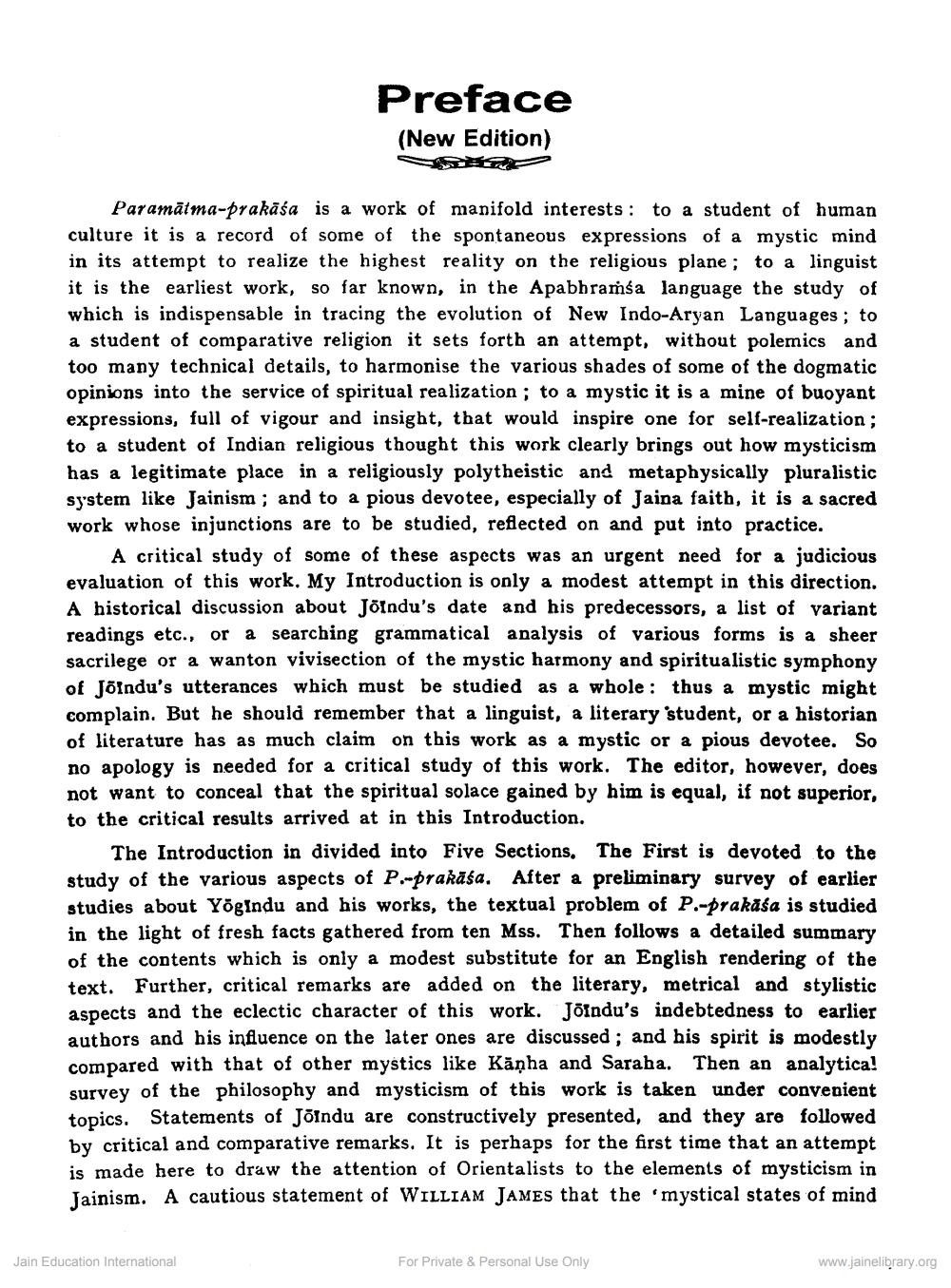Book Title: Parmatmaprakasha and Yogsara Author(s): Yogindudev, A N Upadhye Publisher: Paramshrut Prabhavak Mandal View full book textPage 9
________________ Preface (New Edition) Paramātma-prakāśa is a work of manifold interests: to a student of human culture it is a record of some of the spontaneous expressions of a mystic mind in its attempt to realize the highest reality on the religious plane; to a linguist it is the earliest work, so far known, in the Apabhraṁsa language the study of which is indispensable in tracing the evolution of New Indo-Aryan Languages; to a student of comparative religion it sets forth an attempt, without polemics and too many technical details, to harmonise the various shades of some of the dogmatic opinions into the service of spiritual realization; to a mystic it is a mine of buoyant expressions, full of vigour and insight, that would inspire one for self-realization; to a student of Indian religious thought this work clearly brings out how mysticism has a legitimate place in a religiously polytheistic and metaphysically pluralistic system like Jainism; and to a pious devotee, especially of Jaina faith, it is a sacred work whose injunctions are to be studied, reflected on and put into practice. A critical study of some of these aspects was an urgent need for a judicious evaluation of this work. My Introduction is only a modest attempt in this direction. A historical discussion about Joindu's date and his predecessors, a list of variant readings etc., or a searching grammatical analysis of various forms is a sheer sacrilege or a wanton vivisection of the mystic harmony and spiritualistic symphony of Joindu's utterances which must be studied as a whole : thus a mystic might complain. But he should remember that a linguist, a literary student, or a historian of literature has as much claim on this work as a mystic or a pious devotee. So no apology is needed for a critical study of this work. The editor, however, does not want to conceal that the spiritual solace gained by him is equal, if not superior, to the critical results arrived at in this Introduction. The Introduction in divided into Five Sections. The First is devoted to the study of the various aspects of P.-prakāśa. After a preliminary survey of earlier studies about Yögindu and his works, the textual problem of P.-prakāśa is studied in the light of fresh facts gathered from ten Mss. Then follows a detailed summary of the contents which is only a modest substitute for an English rendering of the text. Further, critical remarks are added on the literary, metrical and stylistic aspects and the eclectic character of this work. Joindu's indebtedness to earlier authors and his influence on the later ones are discussed ; and his spirit is modestly compared with that of other mystics like Käņha and Saraha. Then an analytica! survey of the philosophy and mysticism of this work is taken under convenient topics. Statements of Jõlndu are constructively presented, and they are followed by critical and comparative remarks. It is perhaps for the first time that an attempt is made here to draw the attention of Orientalists to the elements of mysticism in Jainism. A cautious statement of WILLIAM JAMES that the mystical states of mind Jain Education International For Private & Personal Use Only www.jainelibrary.orgPage Navigation
1 ... 7 8 9 10 11 12 13 14 15 16 17 18 19 20 21 22 23 24 25 26 27 28 29 30 31 32 33 34 35 36 37 38 39 40 41 42 43 44 45 46 47 48 49 50 51 52 53 54 55 56 57 58 59 60 61 62 63 64 65 66 67 68 69 70 71 72 73 74 75 76 77 78 79 80 81 82 83 84 85 86 87 88 89 90 91 92 ... 550
